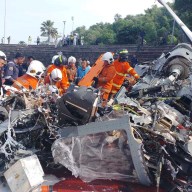VANCOUVER – As host of the 2010 Winter Olympics, Canada isn’t vulnerable like China to the kind of international protest dogging the torch relay for this summer’s Beijing Games, a rights expert and a community activist said Tuesday.
China’s human rights record has prompted protests around the globe as the 2008 Olympic torch travels throughout Europe, the United States and Asia, and tensions are high that when the torch arrives in China itself, violence could erupt.
World leaders are publicly mulling over boycotts of the opening ceremonies, while the International Olympic Committee said it’s going to review future international torch relays in the wake of debacles in London and Paris.
Vancouver’s Olympic organizers said Tuesday they’re saddened by the events unfolding around the 2008 Games but won’t comment on how the protests affect their own plans.
“As we monitor the Beijing 2008 Torch Relay in the coming days and months, we will naturally take advantage of opportunities to gather relevant knowledge that can be used in our planning,” said a statement released by the organizing committee known as VANOC.
“That said, we are still in relatively early stages in planning all aspects of the 2010 relay so it would be premature to speculate on any elements of the plans.”
The same kind of outrage greeting the 2008 Games simply won’t exist for Vancouver, said Michael Byers, an international law professor and member of the B.C. Civil Liberties Association.
“If one was an environmentalist, certainly the existence of the Alberta tar sands would raise pretty significant levels of concern but whether that would actually turn into protest, I doubt it,” he said.
“In terms of human rights, again, (there are) First Nations issues. There are really problems there but it doesn’t rise to the same level, at least in terms of a global concern.”
But one Vancouver housing advocate said there is a growing discontent about the impact of the Games on the local level and capturing international attention may move to the front of their agenda in the years leading up to 2010.
“When more moderate groups like ours are unable to get to the table or we’re not able to advance these issues in a meaningful way, then I think it really does create a kind of climate where more protests are likely to happen,” said Am Johal of the Impact on Communities Coalition.
“I think that when the torch does come through, if the government don’t proceed quickly with a real plan, I think we’re going to see that level of anger hit, not just local and national headlines, but it will become an international issue.”
A group called the Anti-Poverty Coalition has already disrupted some VANOC events and vandalized the 2010 Games countdown clock in downtown Vancouver.
Byers said while the protests around Beijing may force some change on the part of the Chinese government, the next step needs to be for world leaders to add their voice to the opposition.
“I do think that if the Chinese authorities continue with their crackdown in Tibet, that democratic countries like Canada need to seriously think about ramping up their own official level of protest and in this context I think we need to be talking about, at a minimum now, leaders’ boycotts of the Olympics,” he said.
Canadian Prime Minister Stephen Harper said his government has no plans to boycott and B.C. Premier Gordon Campbell announced he intends to attend the 2008 Games.
Campbell said it’s important for British Columbia to be there as the next host but also to send a message about the value of the Olympics.
“I can’t think off any other place where North Korea marches into together with South Korea; those are the kinds of things Olympics can do,” he said.
“It’s the spirit of what we want to be that I think is so important about the Olympics and that’s something that I think we have to keep on reaching for and striving for. Sometimes, they are difficult days and sometimes they’re not but I think it’s worth striving for.”
Vancouver activists have long promised a campaign of opposition leading up to the 2010 Winter Games in Vancouver, which Olympic organizers have said they respect and will do their best to accommodate.
That’s what also differentiates the 2010 Games from those in Beijing, Byers said.
“Canada is not China, Vancouver is not Beijing,” Byers said.
“It’s a different context within a democratic society where there is a recognized right to protest and a long history of police working with the protesters to avoid violence and escalation.”
Olympic sponsors as well say they aren’t concerned about the potential that their brands will be tainted by political concerns in 2008 or 2010.
“It’s premature to speculate on what the political situation might be (in 2010),” said Beja Rodeck, the director of media relations for RBC, a financial institution that’s one of two major sponsors of the 2010 torch relay in Vancouver.
“Certainly we share everyone’s hope for a peaceful resolution.”
A spokesman for Coca-Cola, which has sponsored every Olympics since 1928, said they have no plans to withdraw their support of the Games over political protests.
“I know that some groups are trying to use the Olympics to send a political message and we understand that, however our focus is on the Olympics and the ideals of the Olympics,” said David Moran, the director of communications for Coca-Cola Canada.
“We’re going to stick to the broader messages of sport and Olympic values.”
During the lead-up to the 1988 Olympics in Calgary, the Lubicon Cree First Nation held protests along the torch relay route, trying to force a new land settlement.
The protests gained world-wide attention but it wasn’t until many years later that their disputes with the government were settled.
















